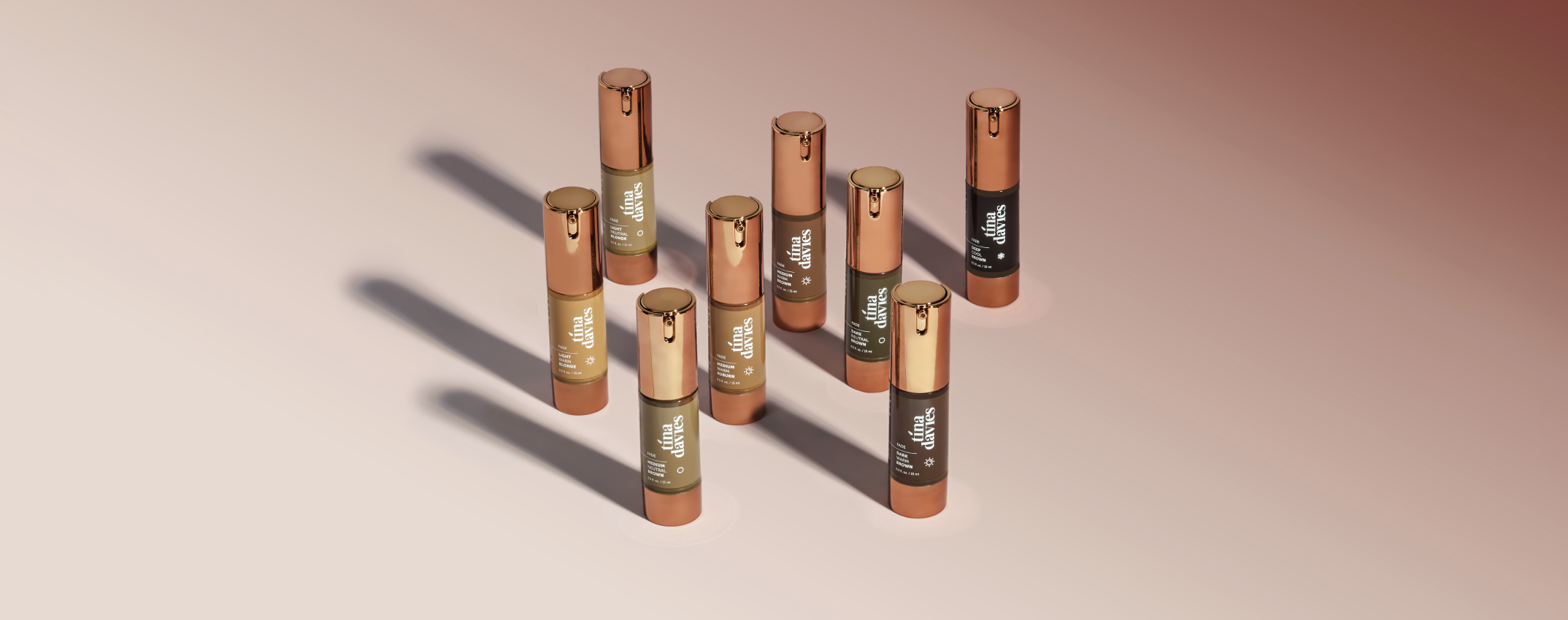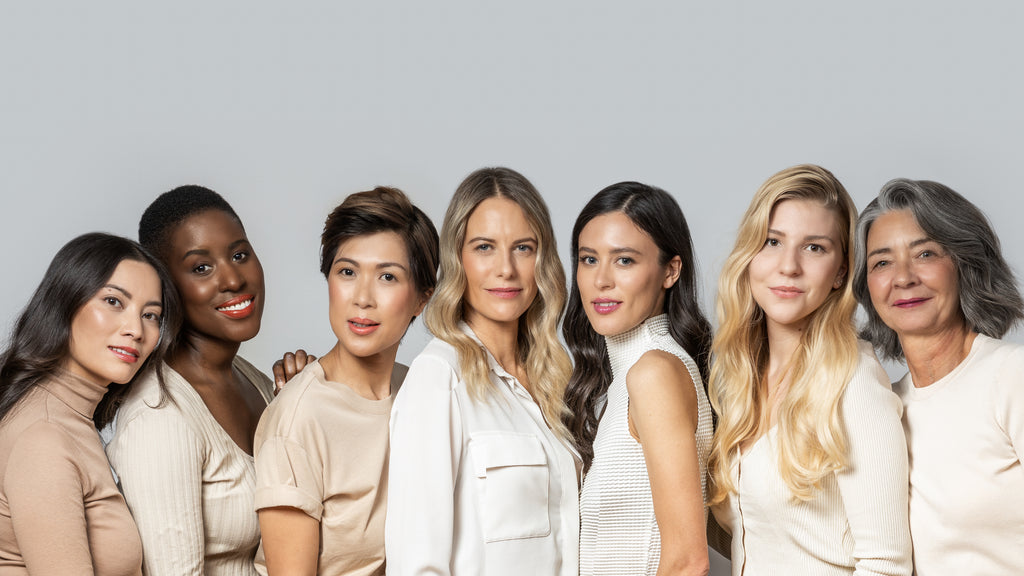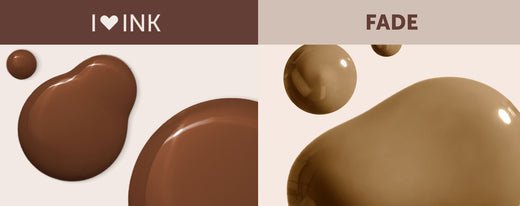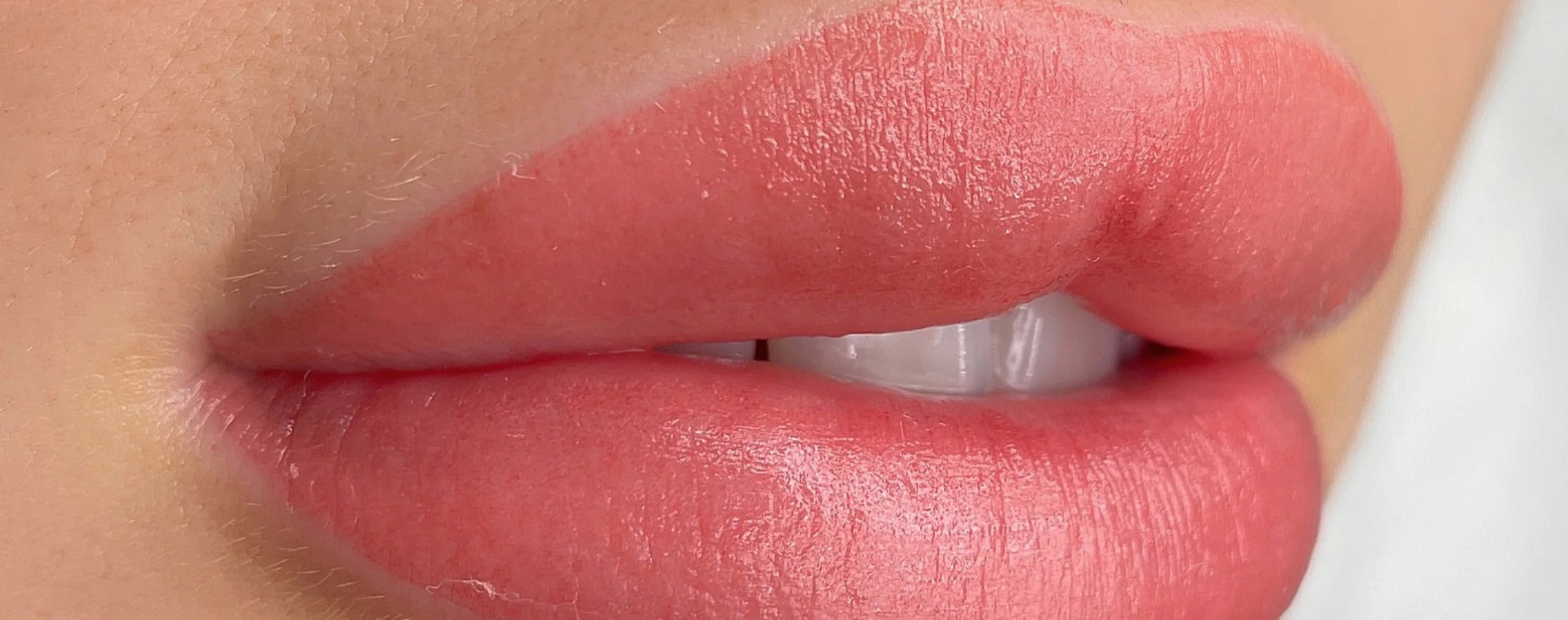
Introducing: FADE Eyebrow Pigment Collection
At Tina Davies Professional, we’re always listening to the needs and struggles of artists. Over the past few years, we’ve been tirelessly gathering feedback from our international artist community to pinpoint what you need in a pigment. Our new FADE Eyebrow Pigment Collection will empower you to explore your full creative potential, without the fear of long-term consequences. PMU is always a commitment, but with the flexibility of this collection, the color doesn’t have to be forever. This will allow you to adapt your brow designs and colors over time WITH your client, for optimal long-term client relationships.

Understanding color theory and the ingredients in your pigments is one of the most important factors in getting excellent healed results, especially when using a new pigment line. This will allow you to make better decisions when choosing a pigment for your client, and help you predict how your client’s brows will heal over time, so you can communicate this with them to maintain great client relationships.
In this blog post, we’re going to walk you through our new pigments, describe each color, explain the ingredients we used, provide tips on how to choose the right color for your clients and show you some healed results from artists in our community. We also have some pro tips for using FADE pigments and a sneak peek into our newest online course!
Let’s dive in!
About the Collection

Our new FADE Eyebrow Pigment Collection is a hybrid line of pigments that is comprised of mainly inorganic ingredients. These pigments will gently fade into a softer version of the original color within 12-24 months in most applications however, results will vary depending on client and technique.
FADE is ideal for artists and clients who want beautiful eyebrows without committing to a lifelong shape or color. This provides clients with the convenience of waking up with beautiful brows and also the flexibility to change their brows over time once the pigment fades.
Let’s learn more about each of the 8 pigments of the FADE Eyebrow Pigment Collection!
Meet the LIGHT pigments...
 Light Warm Blonde for golden-blonde brows
Light Warm Blonde for golden-blonde brows

Light Neutral Blonde for ash-blonde brows
Meet the MEDIUM pigments...

Medium Warm Auburn for reddish-brown brows*
*can also be used as a warm modifier

Medium Warm Brown for rich-brown brows

Medium Neutral Brown for ash-brown brows
Meet the DARK & DEEP pigments...

Dark Warm Brown for vivid-brown brows

Dark Neutral Brown for strong-brown brows
Deep Cool Brown for blackish-brown brows
FADE CI Codes Explained

Now, let’s break down FADE pigments even further!
You’ve probably seen Color Index codes (or CI codes) on your pigment labels, but do you know how to read them or understand what they really mean?
CI codes use a standardized system to identify and classify pigments (in their powder form) based on their chemical composition and color properties - which can easily tell us whether a pigment's ingredients are organic or inorganic.
Organic ingredients can be identified by CI numbers 11000-74999, while inorganic ingredients can be identified by CI numbers 77000-79999.
For example, Yellow 138 (CI 56300) falls between CI numbers 11000-74999, making it an organic ingredient. Iron Oxide Yellow (CI 77492) falls between CI numbers 77000-79999, making it an inorganic ingredient.
Most pigment formulations on the market today are a hybrid blend of organic and inorganic pigment ingredients, as both have unique and distinct qualities. By reviewing the CI codes of a pigment formula, you’ll be able to uncover what exact ingredients make up the pigment, whether it’s comprised more of organic or inorganic ingredients, and how it can be expected to behave in the skin.
Below, we will introduce each of the color ingredients used in FADE, along with their CI codes and a brief explanation of why they are ideal for brow pigments.







Did you know: Despite the fact that Carbon Black is technically an inorganic ingredient, it has the smallest particle size out of any organic or inorganic pigment, which is why it behaves more like an organic ingredient - in the sense that it is easier to implant and longer-lasting than other pigment ingredients.
The Permanence of Pigments

Let’s talk about what puts the P in PMU!
It is important to understand that the "permanent" in ‘permanent makeup does not necessarily mean "forever". Over time, pigments can fade due to a variety of factors, such as exposure to sunlight, natural skin exfoliation, and the body's immune response, as well as pigment ingredients, the artist's technique, and the client’s skin type.
Due to the unique properties of our FADE Eyebrow Pigment Collection, you can expect visible fading to a softer version of the original color within 12-24 months.
However, it’s crucial to note that we do refer to all pigments as permanent, due to the fact that the individual particles may reside in the skin forever - even once they are no longer visible to the eye. Pigments are deposited in both the epidermis and the upper layers of the dermis during a procedure. While the skin regeneration cycle pushes pigment out of the epidermis within a few weeks, most pigment in the dermis stays put.
Since organic and inorganic ingredients have varying particle sizes, they, therefore, tend to also have differing longevity. This means that these ingredients can fade in the skin at different rates, and this is one of the reasons why many hybrid formulas can historically fade too warm or too cool over time. For FADE, we have ensured that the pigment ingredients were ground down and measured to be even in size - for better color stability and more uniform fading over time.
There are many other factors that influence how much time pigment is visible in the skin, or how visible it is over time, like pigment type, particle size, application technique, and saturation levels.
Lightfastness Explained
Now that we understand a bit more of what puts the ‘permanent’ in permanent makeup, let’s look at just one of the key factors that influence gradual fading over time…. lightfastness!
Lightfastness is the ability of the pigment ingredients to resist fading or color change when exposed to light. Ingredients with similar lightfastness in a pigment are essential to ensure that the color ingredients remain stable and true-to-tone as they age over time.
In general, ingredients that are more resistant to fading or shifting will have a higher degree of lightfastness.
Pigments that are more resistant to fading are typically those that have larger and more complex chemical structures, which make them more stable and less prone to degradation.
The Blue Wool Scale is the standardized method for determining the lightfastness of colorants, including dyes and pigments when exposed to light. The scale ranges from 1 to 8, with 1 being the least lightfast (least stable) and 8 being the most lightfast (most stable).

This is a key determining factor when blending custom colors, as the lightfastness of individual pigments can have a significant impact on the longevity of the PMU.
Once in the skin, the pigment will begin to break down and fade over time, especially when exposed to variables like UV light from the sun or artificial sources. If the individual ingredients in the pigment are not lightfast, they can break down and fade at different rates, resulting in a result that appears patchy or discolored. This is one of the reasons why some existing pigments or inks have been known to age with either an ashy or warm hue over time.
To prevent this color instability, we have manufactured FADE by carefully selecting ingredients that have compatible stability and high lightfastness. FADE is designed to gently fade over time into a softer version of the original color, allowing you to easily refresh your client’s brows for years to come.
Choosing the Right Color For Your Clients
One of the unique features of the FADE Eyebrow Pigment Collection is the intuitive color naming system. We cut out the guesswork and eliminated any chance of confusion when selecting pigment for your client.
How it works: Choose your pigment value, temperature, and color!

Selecting the best color for your client is a crucial step to achieving a natural and flattering result. We understand that color choice can often be overwhelming, which is why the FADE color naming system is straightforward and intuitive. The color range is also fully complete, with 8 thoughtfully-selected colors for the ideal number of options.
You simply need to consider the client's skin undertone, as well as the desired value, temperature, and color of their goal eyebrows.
Here is our suggested method for selecting the best FADE pigment for your clients:
First, choose the desired pigment value for your client: light, medium, dark, or deep.
Remember that you will need to choose a pigment value that provides enough contrast against your client’s skin tone. For example, a very fair client will look great with light or medium eyebrows, but dark or deep eyebrows might be too strong, especially if they have light-colored eyebrow hair. On the flip side, a client with very dark skin will need a dark or deep-colored pigment so it ‘shows up’ on the skin when healed.
Next, choose the temperature of the color - warm, neutral, or cool. A client with cooler skin undertones is better suited to neutral or warm pigments, as the pigment tends to cool down during the healing process. A client with warmer skin can use a warm, neutral, or cool pigment.
Then, you choose your color based on your client’s hair color and brow preference - blonde, auburn, or brown, and VOILA you have your perfect pigment!
The Cooling Effect
Another important factor that greatly affects the healed outcome is something we refer to as The Cooling Effect of pigment.
As pigment heals in the skin, you may notice that it will often look duller and cooler/ashier after the initial healing period of approximately 30-45 days. This is the “cooling effect". You always need to consider this factor with your pigment selection to avoid results that heal too cool/ashy. Warm temperature pigments and modifiers are your friend to help avoid ashy healed results. This is why you’ll often hear that artists like to add a few drops of a warm modifier or warm color into their chosen pigment for that “warm insurance.” This is also why you need to avoid cool pigments on cool skin, since it would lead to an extra cool result by default of the “cooling effect.”
To summarize:
Client undertone + pigment temperature + the cooling effect = healed result
Keep these factors in mind when choosing your colors and you’ll be on the right path to great healed results. Remember that your technique also greatly affects the healed results so be sure to take good notes to learn from the approach of each of your cases. Sometimes, the color choice can be right, but the technique isn’t, or vice versa. This reflection will speed up your learning curve as you'll learn what worked and what didn’t work as you move on from client to client.
Fitzpatrick Skin Type Suitability 
Another factor to keep in mind when choosing the best color for your client is the Fitzpatrick Scale, but don’t worry - we have made this step easy, too!
The Fitzpatrick skin type system, or The Fitzpatrick Scale, is a widely used classification system that is used to describe how different skin types respond to sun exposure. There are six Fitzpatrick skin types, ranging from Fitz 1 (very fair skin that burns easily and never tans) to Fitz 6 (very dark skin that never burns).
On the FADE Color Chart, you’ll see we have model examples for each Fitzpatrick Skin Type, along with a Fitzpatrick Skin Type Suitability Guide to make pigment selection as easy as possible for you. This guide shows you which pigment is suitable for each skin type.

Let’s look at this in more detail!

Light Warm Blonde is suitable for clients in the F1-F2 Fitzpatrick Skin Type range.
Light Neutral Blonde is suitable for clients in the F1-F2 Fitzpatrick Skin Type range.
Medium Warm Auburn is suitable for clients in the F1-F3 Fitzpatrick Skin Type range.
Medium Warm Brown is suitable for clients in the F1-F3 Fitzpatrick Skin Type range.

Medium Neutral Brown is suitable for clients in the F1-F3 Fitzpatrick Skin Type range.
Dark Warm Brown is suitable for clients in the F2-F6 Fitzpatrick Skin Type range.

Dark Neutral Brown is suitable for clients in the F2-F6 Fitzpatrick Skin Type range.
Deep Cool Brown is suitable for clients in the F3-F6 Fitzpatrick Skin Type range.
Using the Color Chart
Along with the Fitzpatrick Skin Type Sustainability Guide, The FADE Color Chart features all of the crucial information you will need to select the best color for your client including the value, temperature, and color, along with the pigment CI codes for each color.

On the color chart, you will find visual examples of clients who are suitable for each individual pigment color, the color name, a description of the color, and our suggested Fitzpatrick range.
You will also see a drawdown of the pigment color, the temperature icon for that color, and a full list of CI codes for each pigment, which are in order of quantity. The first CI code listed is the most dominant color in that pigment, with the last ingredient being the least dominant color.
A physical FADE Eyebrow Pigment Color Chart is included with every purchase of the FADE Eyebrow Pigment Collection, while a digital version is available with every purchase of FADE Singles.
Before, After, & Healed Results
The proof is always in the pudding… let’s look at RESULTS!
Below are just a few examples of some before, after, and healed results using the FADE Eyebrow Pigment Collection. 
Pigment: Light Warm Blonde
Needle: Tina Davies 14 Curved Microblade
Artist: Tina Davies

Pigment: Medium Warm Brown
Needle: Precision 0.35 1 Round Liner
Artist: Antony Turner

Pigment: Medium Warm Brown
Needle: PIXL 0.25mm 7 Curved Magnum Long Taper
Artist: Tina Davies

Pigment: Medium Neutral Brown
Needle: 16 Curved Nano Microblade
Artist: Tina Davies

Pigment: Medium Neutral Brown and Dark Neutral Brown
Needle: PIXL 0.30mm 5U Curved Flat Medium Taper
Artist: Ramona Krusinskiene

Pigment: Dark Warm Brown
Needle: PIXL 0.25 1 Round Liner Long Taper
Artist: Antony Turner

Pigment: Dark Warm Brown
Needle: 16 Curved Nano Microblade, PIXL 0.25mm 7 Curved Magnum Long Taper
Artist: Tina Davies

Pigment: Dark Neutral Brown
Needle: PIXL 0.35mm 1 Round Liner Long Taper
Artist: Ramona Krusinskiene

Pigment: Deep Cool Brown
Needle: 18 U Nano Microblade, PIXL 0.25mm 7 Curved Magnum Long Taper
Artist: Tina Davies
Pro Tips
Here are a few technical tips to help you achieve your best results with FADE.

Dispensing Tips
Place your finger on the nozzle opening and shake the bottle well before each use, so that the pigments are well mixed by the internal mixing bead. Hold the pigment spout downward, so that the nozzle is facing into your pigment cup, and pump a few times until you achieve your desired amount.

Packing Tips
For faster deposit when performing machine shading, consider using needle configurations such as 3, 5, or 7.

Saturation Tips
Once healed, expect the color to fade out noticeably from the 'immediately after' results. This is different from what you may be used to with organic-based pigments which tend to retain much of their saturation when healed.

Pigment Flow
FADE may seem a bit thicker in consistency than I ❤️ INK, but it remains an ideal consistency for both manual and machine methods.

Needle Positioning
For most techniques, hold your needle upright between 60-90 degrees to the skin in order for the needle to enter directly into the upper dermis.

Color Choice
Choose a color that provides the right amount of contrast against your client's skin tone by referring to our Fitzpatrick Skin Type Suitability guide.

Stretch
Maintain a firm 3-point stretch while tattooing in order for the pigment to penetrate the skin effectively.

Technique
Focus on consistent tattooing movements to ensure a smooth and even pigment deposit into the skin.

Layering
Due to the pigment composition, you may need to apply several layers to build up the desired color.

Previous PMU
Previous PMU in the skin will impact the healed results.

Maintenance
For optimal results, refresh your client’s brows with a touch-up once they have faded by at least 50%.
Preorder FADE!
Prepare to take your artistry to new heights with the highly anticipated FADE Eyebrow Pigment Collection. This revolutionary lineup of eyebrow pigments is set to transform the way you create stunning, flexible, and trusted results for your clients. And the best part? You can secure your exclusive set by preordering! Why wait when you can be among the first to use these game-changing pigments? Sign up now!

Here's why you shouldn't miss out on this incredible opportunity:
1️⃣ Elevate Your Craft: The FADE Eyebrow Pigment Collection is meticulously crafted with the utmost care, ensuring superior color and flexible results. Immerse yourself in a world of earthy, soft colors that provide exceptional results. It's time to unleash your creativity and offer your clients brows that truly stand the test of time.
2️⃣ Unparalleled Quality: Made in Germany using the finest ingredients, FADE pigments guarantee unmatched safety and performance. Each pigment meets the highest industry standards to ensure flawless application. FADE is cruelty-free, vegan-friendly, and non-toxic. FADE is also EU REACH compliant, which means artists around the world can use this line. Your clients deserve nothing but the best, and FADE delivers just that.
3️⃣ Diverse Shade Range: Our collection features a comprehensive range of 8 colors that cater to every skin tone and hair color. From shades of blonde and auburn to a range of medium, dark, and deep browns, FADE has got you covered. With these pigments in your arsenal, you can effortlessly tailor your techniques to create bespoke brows that your clients will love.
4️⃣ Stay Ahead of the Curve: As a permanent makeup artist, staying on top of the latest trends and advancements is crucial to a successful career. By preordering the FADE Eyebrow Pigment Collection, you'll demonstrate your commitment to continuous improvement in your craft. Be the trailblazer in your industry, setting new standards of excellence that others can only aspire to.
5️⃣ Limited Preorder Bonus: Act now and secure your preorder to unlock an exclusive bonus gift! We appreciate your enthusiasm and want to reward your early support. Preordering the FADE Eyebrow Pigment Collection includes FREE access to a private virtual launch event with Tina herself, as well as enrollment to our newest online course - Redefining Color: The FADE Color Course.
Don't miss this chance to be at the forefront of the permanent makeup industry! Preorder the FADE Eyebrow Pigment Collection today and watch your artistry soar to incredible new heights.
SIGN UP NOW
Learn More
Like what you’ve learned in this blog post? Get ready to take your artistry to the next level by learning more about FADE pigments. 🧑🏼🎨

🦾 Challenge your understanding of color, anatomy, & pigment knowledge, and dive into key topics surrounding the FADE Pigment Collection. This course takes a deep dive into color theory, pigment composition, skin types, color selection, technical tips, case studies, & much more!
Watch the trailer below!
In this course, Tina will personally walk you through all of the information you will need to know to confidently use FADE pigments. Eliminate guesswork, improve your confidence, and cut your working time - for your best results yet.
The full course includes chapters on Color Theory, Color Selection, Pigment Composition, All About Skin, Technical Tips, Case Studies, and so much more…
But we wanted to give you a sneak peek! Preview the course below…
🆓* This course will be FREE for a limited time only, or included with the purchase of any FADE Eyebrow Pigment or the FADE Eyebrow Pigment Collection.




Leave a comment
This site is protected by hCaptcha and the hCaptcha Privacy Policy and Terms of Service apply.